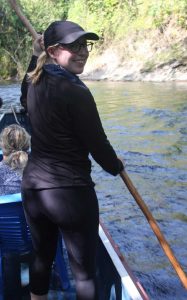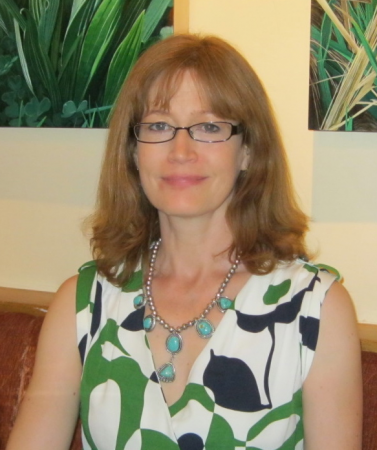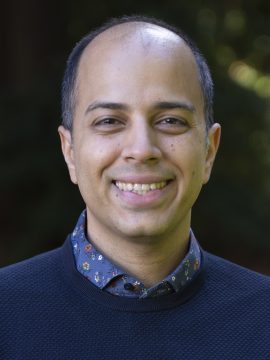

—-Lindsey Paskulin, PhD student in the UBC Department of Anthropology and Graduate Academic Assistant, Communications (spring 2021)
[Caitlyn Yates joined our call from her home in Central Texas in the United States. She had recently moved there from Washington DC, which she described as a tough transition. Now, due to the COVID-19 crisis, her base of operations is her family’s cattle ranch. ]
CY: We have cattle. I grew up rodeoing. I drove a truck in high school- the whole thing- the whole image you have is true.
LP: That’s a fantastic image!
[We started with how she became interested in anthropology.]
CY: My undergraduate studies were in cultural anthropology and political science. That’s when I first dived into ethnographic research, qualitative methods, and the study of social sciences. I completely switched gears during my masters, deciding to focus more on policy and mixed methods.
After a few years, I realised that a lot of the questions I was asking could best be answered by the anthropological theories and methods that I had learned during my undergraduate studies.
…I found myself constantly being drawn back to the anthropological research of my undergraduate projects and to my earlier research interests…
Now, as a PhD student in cultural anthropology, I really want to focus and improve my approach to ethnography. That’s a primary driver for me pursuing this PhD. I think it’ll help me better understand some of the more interdisciplinary research that I am conducting on immigration.
LP: Why immigration and mobility?
CY: I am originally from Texas and I studied in South Texas near the US-Mexican border at a time when immigration became a really hot button topic in the United States— when a lot of unaccompanied children were arriving at the border and being sent to the city I was living in.
This became a persistent trope in the research I was doing. The topic of migration seemed to be consistently present, even though I began my research with more security related questions. And so, as I continued my research, what I became most interested in is understanding the ways in which migrants travel when they are not authorized by governments to do so.
…My research now is looking at the mobility and migration experiences of individuals who are moving through Latin America towards the US and Canada…
Particularly, I want to focus on challenges facing migrants who originate on the African and Asian continents and who then either migrate within Latin America or continue on to North America. I think that ethnographic research is most suitable for understanding and exploring these dynamics.
LP: That’s such an important topic, and so relevant today. But why leave the United States? How’d you choose UBC to base this project out of?
CY: [laugh] That’s such a good question and certainly one I have been asked before. When I started applying for PhD programs, I had three main criteria I was looking for: The first was a program that emphasised methods as a strong component of the training. Second, I wanted a program that really looked at mobility and migration, regardless of where it was located geographically. And third, I needed a university with good funding opportunities for graduate students. UBC really checked all of those boxes.
Even beyond that, what has increasingly drawn me to UBC and to Canada is the fact that a lot of migrants who I have worked with in the past are increasingly bypassing the United States and wanting to ultimately arrive in Canada. This in itself is not really a dynamic that has been explored in a lot of scholarship or policy research as of yet.
…My experience having lived in Mexico, the United States, and soon in Canada provides me with additional lenses into these realities…
LP: You seem to have had a fairly good idea of what you wanted to study at an early point in your career. Do you have a lot of fieldwork experience relating to the study of migration and mobility?
CY: My first ethnographic fieldwork experience was actually during my undergraduate studies, during an immersive study abroad program in Argentina. The project looked at the growth of drug trafficking along the major river connecting Buenos Aires and other major cities in Argentina to the interior of South America. During my master’s program, I worked on a project looking at the security challenges that migrants face in Mexico, mainly around topics like kidnapping, corruption, and bribery. In between my Masters and applying for my PhD, I did a kind of pre-fieldwork, where I wrote magazine articles, blog posts, and policy briefs on transit points for migrants— the routes and hubs, and the challenges facing migrants in certain parts of Central and South America. It was more of an exploratory type of fieldwork, but I have spent months at a time in Colombia, in Panama and in Mexico looking at what is now the basis of my doctoral project.
LP: It must have been challenging. Where was the most difficult place you worked?
CY: [thinking for a second] The hardest place I have ever had to do fieldwork in terms of the logistics is in Southern Panama. The border of the southern province is a highly militarised zone, so to enter you must have permission from the border patrol— it’s an entirely bureaucratic process. Once you enter the province, the highway ends and there is a 150 km zone across which you either have to walk or canoe. I canoed. The jungle zone is unique as there are both Indigenous communities and displaced Afro-Colombian communities living in the same area. The dynamics themselves are widely different from any other place I have done fieldwork, which were primarily in large cities or at least in communities with more established infrastructures.
That was the moment I realised that this place represented a meeting of different elements of mobility and migration; there were people from all over the world who had travelled and were migrating, there were Indigenous communities who were constantly under threat of being displaced themselves, and there was the border patrol adding an extra layer of complexity. And then there was me! [laughing] That’s now where I am proposing to do my fieldwork for my PhD. It will be a challenge to address all of these different communities and the challenges they face within this very isolated space.
LP: Were you well-received by these communities?
CY: Each community is a little bit different. With regards to border control, I certainly had to engage them very directly or else I was met with immense scepticism or apprehension. This sounds bizarre, but a lot of them had trained at US military bases in Texas. Once they realised that I was from Texas, I was no longer this scary potential outsider, I was the Texan. Which then helped them allow me to stay within these zones without them monitoring me as much.
In regard to the folks who were actually migrating, my main point of commonality was that I am an English speaker. These were folks who had been on their journeys now for a few months often only in communities which spoke Portuguese or Spanish. Most of them spoke, to some extent, English so it was a welcome reprieve to the point that I was asked to do some interpreting to navigate some of the miscommunications which had been happening between the Indigenous community, the border patrol, and the migrants themselves. That certainly helped. I also let folks read what I had written— this seemed to establish who I was, but also what lay ahead on their journeys.
LP: What advice do you have for potential anthropology students, existing students, and those seeking to further their education in anthropology?
CY: Throughout my policy career and now, and particularly as I started to study and learn about potential PhD programs, I emailed everyone.
…My first piece of advice is to not be afraid to ask…
Students, potential advisors, folks who had decided not to pursue PhDs— I had conversations with them about their experiences. I think that helped me immensely in narrowing my own research goals and understanding what I was looking for in a program. Also, now that I am in my PhD program, having this system of asking, learning, and growing alongside my classmates and faculty members has really benefited me. So, don’t be afraid to ask and to reach out.
Caitlyn hopes to be moving to Vancouver in the near future and looks forward to forming in-person connections with the department in a post-Covid world.


